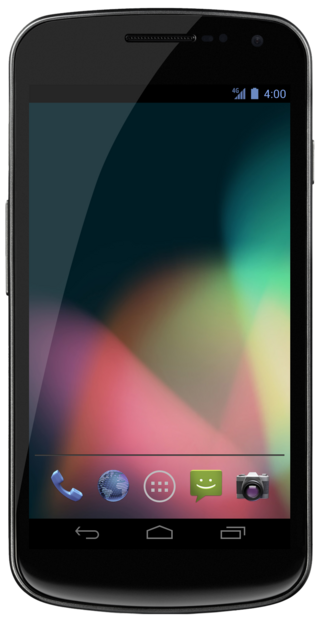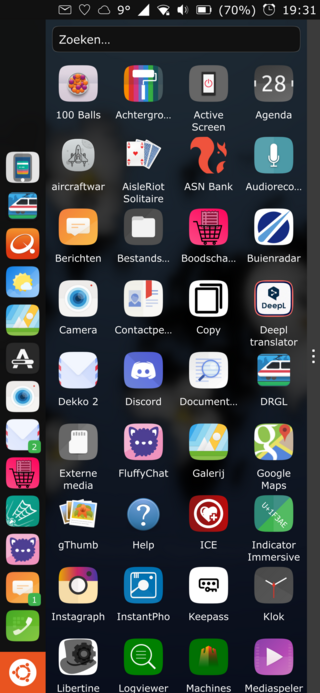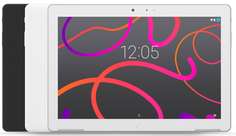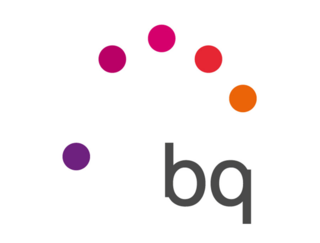
A tablet computer, commonly shortened to tablet, is a mobile device, typically with a mobile operating system and touchscreen display processing circuitry, and a rechargeable battery in a single, thin and flat package. Tablets, being computers, have similar capabilities, but lack some input/output (I/O) abilities that others have. Modern tablets largely resemble modern smartphones, the only differences being that tablets are relatively larger than smartphones, with screens 7 inches (18 cm) or larger, measured diagonally, and may not support access to a cellular network. Unlike laptops, tablets usually run mobile operating systems, alongside smartphones.

Meizu Technology Co., Ltd. is a Chinese consumer electronics manufacturer based in Zhuhai, Guangdong. Founded in 2003 by Jack Wong, Meizu began as a manufacturer of MP3 players and later MP4 players. In 2008, Meizu moved its focus to smartphones. Meizu is the 11th largest smartphone manufacturer in the world, and sold over 20 million units in 2015. In February 2015, Alibaba invested US$590 million in Meizu, acquiring an undisclosed minority stake.
A mobile operating system is an operating system used for smartphones, tablets, smartwatches, smartglasses, or other non-laptop personal mobile computing devices. While computers such as typical/mobile laptops are "mobile", the operating systems used on them are generally not considered mobile, as they were originally designed for desktop computers that historically did not have or need specific mobile features. This line distinguishing mobile and other forms has become blurred in recent years, due to the fact that newer devices have become smaller and more mobile unlike hardware of the past. Key notabilities blurring this line are the introduction of tablet computers, light laptops, and the hybridization of the two in 2-in-1 PCs.

The Galaxy Nexus (GT-I9250) is a touchscreen Android smartphone co-developed by Google and Samsung Electronics. It is the third smartphone in the Google Nexus series, a family of Android consumer devices built by an original equipment manufacturer partner. The phone is the successor to Google's previous flagship phones, the Nexus One and Nexus S.

Ubuntu Touch is a mobile version of the Ubuntu operating system, being developed by the UBports community. Its user interface is written in Qt, and is designed primarily for touchscreen mobile devices such as smartphones and tablet computers, but the original goal of convergence was intended to bring Ubuntu Touch to laptops, desktops, IOT devices and TVs for a complete unified user experience.
Mir is a computer display server and, recently, a Wayland compositor for the Linux operating system that is under development by Canonical Ltd. It was planned to replace the currently used X Window System for Ubuntu; however, the plan changed and Mutter was adopted as part of GNOME Shell.

The Ubuntu Edge was a proposed high-concept smartphone announced by Canonical Ltd. on 22 July 2013. Canonical was seeking to crowdfund a production run of around 40,000 units through Indiegogo. It had the highest target of any crowdfunded project to date, $32,000,000 over a one-month campaign. The Edge was not intended to go into mass production after the initial run, but rather to serve as a demonstration for new technologies for the industry. The Edge fell short of its funding goal, raising only $12,733,521 with 27,633 backers to purchase the standard model of the handset.
Besides the Linux distributions designed for general-purpose use on desktops and servers, distributions may be specialized for different purposes including computer architecture support, embedded systems, stability, security, localization to a specific region or language, targeting of specific user groups, support for real-time applications, or commitment to a given desktop environment. Furthermore, some distributions deliberately include only free software. As of 2015, over four hundred Linux distributions are actively developed, with about a dozen distributions being most popular for general-purpose use.
Linux for mobile devices, sometimes referred to as mobile Linux, is the usage of Linux-based operating systems on portable devices, whose primary or only Human interface device (HID) is a touchscreen. It mainly comprises smartphones and tablet computers, but also some mobile phones, personal digital assistants (PDAs) portable media players that come with a touchscreen separately.

Android One is a family of third-party Android smartphones promoted by Google. In comparison to many third-party Android devices, which ship with a manufacturer's customized user interface and bundled apps, these devices run near-stock versions of Android with limited modifications, and a focus on Google services. Devices that run Android One receive OS updates for at least two years after their release, and security patches for at least three years.
Laptop–tablet convergence describes the tendency in recent years for laptops and tablet computers to converge technologically.

The Meizu MX4 is a smartphone designed and produced by the Chinese manufacturer Meizu, which runs on Flyme OS, Meizu's modified Android operating system. It is a previous phablet model of the MX series, succeeding the Meizu MX3 and preceding the Meizu MX5. It was unveiled on September 2, 2014 in Beijing.

The Aquaris E5 and Aquaris E5 FHD are dual-SIM Android smartphones from the Spanish manufacturer BQ that were released to market in July 2014. The devices shipped with Android 4.4 (KitKat). BQ elected not to skin the operating system and as such it retains the unmodified "Google Experience", such as found on the Google Nexus.

The Aquaris M10 and Aquaris M10 FHD are Android tablets from the Spanish manufacturer BQ that were released to market in October 2015. The devices shipped with Android 5.1 (Lollipop). BQ elected not to skin the operating system and as such it retains the unmodified "Google Experience", such as found on the Google Nexus.

The Meizu MX4 Ubuntu Edition is a smartphone designed and produced by the Chinese manufacturer Meizu, which runs on Ubuntu Touch. It is a previous phablet model of the MX series, representing an alternative edition of the MX4. It is Meizu's first commercially available Ubuntu Touch device and the second commercially available phone with Ubuntu Touch overall. It was unveiled at the Mobile World Congress in March 2015.

The Meizu PRO 5 Ubuntu Edition is a smartphone designed and produced by the Chinese manufacturer Meizu, which runs on Ubuntu Touch. It is an alternative version of the Meizu PRO 5. It was unveiled on February 17, 2016.

postmarketOS is an operating system primarily for smartphones, based on the Alpine Linux distribution.

BQ was a Spanish company brand of user electronics devices, such as smartphones, tablets, e-readers and 3D printers among other products.
The scope for this page is that used for list of open-source mobile phones.












